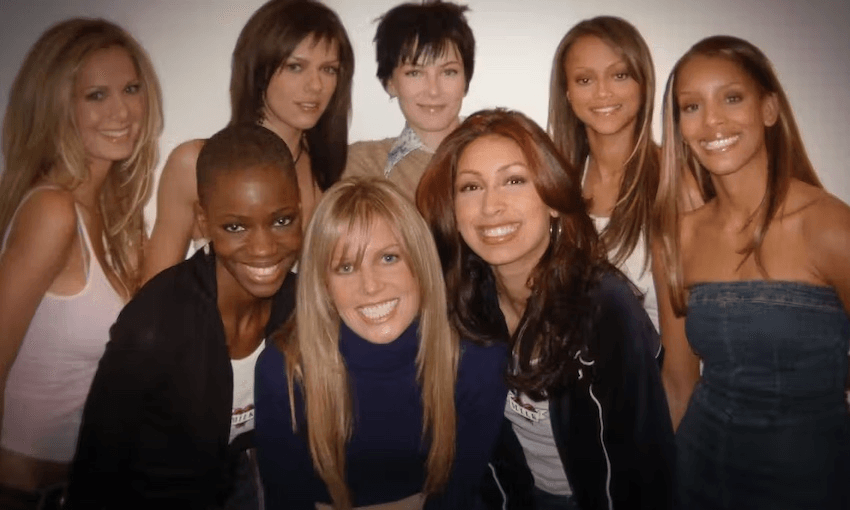TVNZ aired the finale of the much-lauded six-part drama last night. Here’s what The Spinoff’s two Madeleines thought.
EXTREME SPOILER WARNING. DON’T SAY WE DIDN’T WARN YOU.
Madeleine Chapman
And so, the only show that I considered appointment viewing this year has come to an end. After the Party started so strong, with the introduction of a largely-unsympathetic protagonist (Penny, played exceptionally by Robyn Malcolm) and a mystery of the most depressing nature – did Penny’s husband Phil (Peter Mullan) sexually assault her teenage daughter’s friend as Penny claimed?
But lots of shows start strong and then fall over after three episodes, having front-loaded all the best quips and shocking turns to get people invested in the first place. Where After the Party rises above nearly every other local drama is in its pacing. After the first episode, I was stressed the hell out and not convinced I wanted to witness another five hours of it. The second episode gave a glimpse of hope without falling into premature resolutions. The third episode was back to despair. And so on until I hit play on the sixth and final episode nervously confident that they might just pull it off, having been patient in laying the relational foundations of the series.
And they did, in the satisfying-yet-not way of the whole show. As viewers, we knew Penny was right, but not without pause. Some beautiful scenes depicting Penny’s doubts over her own memory (did she see Phil stroking the boy’s chest? Or had he just patted him on the shoulder?) only added to the gnawing sense that maybe, just maybe, she was overreacting. But of course she wasn’t, and as unlikeable and unsympathetic as she may have been in every other aspect of her life, she wasn’t wrong.
The finale could’ve gone any number of ways. The most “TV magic” would have been a new piece of evidence, a public confrontation and admission of guilt, and a final scene of Phil in handcuffs being led away to his fate while Penny reunites with her estranged daughter. That version would have played well and been entirely satisfactory for a stunning mini-series. But After the Party went for the grey area once again, with justice (of a sort) served, but no satisfying public redemption for Penny, who’d spent five years alienating everyone she knew in pursuit of the truth. Instead, she’s left with the knowledge that she was right and that there will be no more victims. And even though that may mean further downfall for her, she’s content.
After the Party is a New Zealand show that succeeded because of its refusal to cater to the broadest of audiences. There’s no clear hero, the subject matter is deliberately a topic that most would rather avoid, and the resolutions are messy and incomplete. For that, it managed to be an entirely original and wholly devastating series, the likes of which I hope to see again soon on our screens.
Madeleine Holden
After the Party is the best New Zealand TV show I’ve seen, bar none. Duncan Greive has detailed the elements that set the show apart, which persist to the final episode: a romping pace; compelling performances from the entire cast, with Peter Mullan’s especially chilling and convincing; and a truly novel and unlikely protagonist, in Robyn Malcolm’s middle-aged, dogged, and often unlikeable Penny. I second all of that, but want to focus on the aspect of the show that gripped me most, which is how it dealt with the subject of men who rape kids.
Could there be a harder one to get right? After the Party portrays it all with sickening verisimilitude, yet without making you turn away. There’s the rapist, wielding his good-guy, pillar-of-the-community status as a shield against too much investigation. The community of enablers who stick their heads in the sand because they don’t want to see what’s in front of them. The ambiguity, the uncertainty, the grey areas. The way grooming starts out feeling so much like love – and like so much love. The gnawing self-doubt; the years-long process of piecing together what really happened; the devastating ease with which rapists shut their victims up and make them feel complicit (“You were special,” Phil tells Tom in a gut-punching scene. “You just wanted too much.”)
Then there are the parts of After the Party that felt so different to real life; so surprising and satisfying. This woman – this shitty friend, this shrill environmentalist, this stubborn, cocky, and sometimes narcissistic obsessive who bulldozes every interpersonal boundary she comes across – she pursues truth and justice at any cost. Estrangement with her daughter, isolation from her entire community, spiralling mental health, near misses with restraining orders and job loss, a swarm of wasps: all of this Penny would rather stomach than the knowledge she was privy to something deeply wrong and didn’t do everything in her power to bring it to light. That kind of person is some strange mix of vanishingly rare and perfectly plausible – the closest thing we get to a hero – so Penny is an incredible character to see on TV.
Equally incredible is the ending. Had the show hemmed too closely to real life, this is what would have happened: Penny would finally drop her pursuit, realising it’s cost her too much. Grace and Phil would move to Scotland, where Phil would keep grooming and raping boys with impunity. Tom – who knows; he’d probably bottle it forever. Instead, we get this jaw-dropping final scene: a confrontation you watch through your fingers; a crystal-clear resolution of ambiguity (“You raped me,” Tom says, fighting back tears, then says it once more); cathartic vigilante justice.
This is just not how things actually play out for survivors of sexual abuse. But it makes for thrilling TV.



